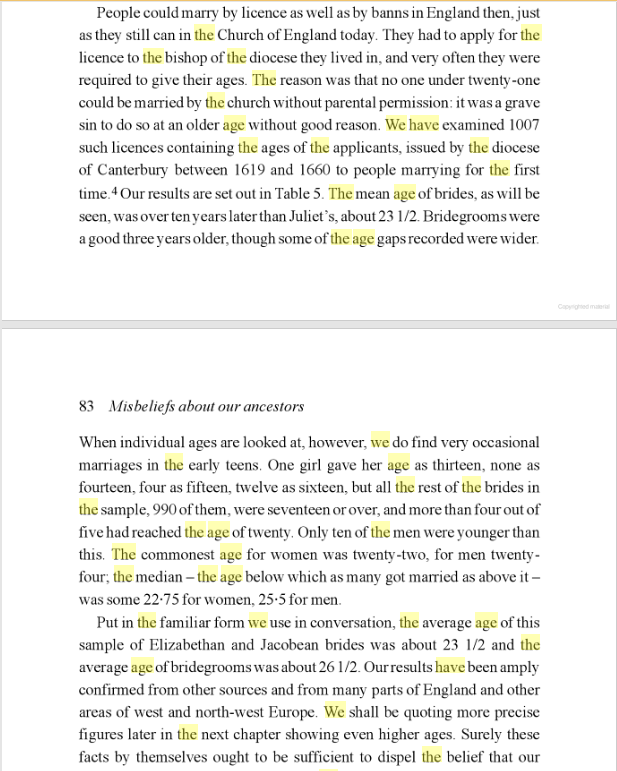I read this article on “5 Reasons ‘Traditional Marriage’ Would Shock Your Ancestors” by one Kathy Benjamin on Cracked, considered responding and decided against it, because ‘what’s the point?’ Then somebody asked me on Ask.FM to respond, so here it goes.
The article’s main flaw (other than it being obvious left-wing evangelization with a complete dearth of humour on a supposed humour site) was that it cherry-picked every small edge case in Western history to draw a pattern for the gullible while ignoring larger realities.
Now onto something more thorough.
#5. People Didn’t Marry Young
First, yes they did, even if we accept the author’s own misrepresented data. In the US the average age of first marriage is 27 for women and 29 for men. This is actually younger than Western Europe where age of first marriage is almost invariably over 30 for both men and women. The highest age Kathy cites are: 23-24 years old and grooms 26-27 (in England, where the average age is now 32.1 & 30), a difference of 2-4 years. Her other link points to a 1890 high of 22 for women and 26 for men, a difference of 3-5 years. 2-5 years is a rather significant difference.
Other than this Kathy simply distorts what the links say:
In general, the marriage age in Western Europe has stayed constant. English records from the 1600s show that brides were usually 23-24 years old and grooms 26-27.
Click the link:

The mode (ie. ‘usually’) for women is given as 22, the median as 22.75. The mean was 23.5. So, 22 was the usual age and half of women married at 22 or earlier; there were just some outliers who married later pulling the average above. Bu even if we use the mean, women in Britain in the 1600s still married 4 years earlier than the US today (and 6.5 years earlier than the UK today).
For men the relative situation is much the same Mode: 24, Median: 25.5, Mean: 26.5.
We can see Kathy doesn’t really understand statistics.
When colonists in early America started getting married slightly younger, it was considered odd enough that Benjamin Franklin commented on it.
Here she gives the impression that Franklin was like ‘wow man, those Yankees are like so far out there.’ If you follow the link, you see that Benjamin Franklin simply looked at the subject and found that yes, Americans had earlier marriages and that settled European cities were not naturally replacing themselves due to low wages preventing family formation. If anything, he’s commenting on the self-destruction caused by the (conditions causing) later marriages of the settled European cities. (Side note for NRx: Franklin noticed that cities are demographic shredders back in 1814).
But the marriage age in America soon settled back into the normal pattern, and by 1890, most couples were getting married in their mid-to-late-20s again.
Again read the link. Marriage age rose from 20 to 22. After which it shrunk again.
If you read the earlier .pdf (Table 2, p. 28), female marriage age peaked in 1880-1900 at 23 (after a civil war which pretty much destroyed an entire generation of young men) after which it declined steadily reaching a low of 20 in 1960. It wasn’t until 1980 that the marriage age again reached what it was in the post-bellum period. So, by “the normal pattern” she means an anomalously high few decades around the turn of the century following a civil war which destroyed the supply of single young men.
Also, notice that this high was the age of 23, which is still almost a half-decade lower than the average age is now.
Also, notice that the earliest time here is the 1600’s. So, she’s ignoring millennia of Western Civilization prior to this; not to mention she ignores anything outside of England. You can read about the uniqueness of Germanic marriage patterns here.
As can be seen, Kathy is simply incorrect across the board.
#4. Marriages Were Short
Ancient Greece and Rome both allowed divorce, and the most famous divorcee of all time is certainly Henry VIII, whose first one occurred in 1534.
Yes, the Pagans did divorce, but in Rome, it was not at-will, it was at-fault and solely the right of the husband, at least for the first few centuries (ie. before Rome declined). Once Rome began declining, calls to end easy divorce were implemented. In Greece, while divorce was allowed, monogamy was still the rule.
Are these really the models Kathy wants to hold up as an example?
King Henry was one person. Anecdotes /=data, especially when said anecdote is a historically significant king because of his divorces.
John Milton, the poet most famous for Paradise Lost, also wrote four books on how awesome divorce was in the 1640s… Inevitably, religious figures freaked out and tried to ban them.
First, she undermines her own point here; she says that Milton was the exception at the time not the rule. But beyond that, read the link:
To Milton, canon law was just another weapon used by the “Great Whore” against men, and since the English church continued to enforce such laws governing marriage and divorce, she was the whore’s accomplice. Milton wants to restore manly dignity to the practice of marriage, first by restoring the power of divorce exclusively to husbands, and second by insisting that marriage is principally a kind of friendship much like the manly friendships described by Socrates in the Symposium and Aristotle in the Nicomachean Ethics–a kind of enlightened heteroerotic pederasty. Milton’s zeal against canon law is the same as his zeal against bishops–the goal is to restore manliness to English Christianity. This is why he has no patience with the widespread European Protestant notion that divorce should be allowed to wives as a protection from abusive husbands. Milton wants to liberalize divorce, but for men, not for women.
Milton was closer to an extreme MRA than anything. I wonder why Kathy would hold him up as a model?
In America, the 1870 census revealed such a high number of divorces that the government ordered a report on the subject.
She’s being very disingenuous here. Read the link, flip to p. 138. This crisis of divorce was caused by a increase (157% increase over 20 years) in divorce that was still a low rate of divorce. New Hampshire had the highest average divorce rate, at 1 divorce per 10 marriages, meanwhile Maryland had 1 divorce per 62 marriages.
The divorce crisis was caused by divorce rates ranging from < 1% to 10%. A far cry from today’s 40-50%.
By the 1920s, divorce was so common that society was convinced marriage would soon be a thing of the past.
By “so common“, she means a peak rate of 16% (1/6) during 1929, which you might remember as the year of Black Friday and the start of the Great Depression. So even when the economy was being annihilated, the high divorce rate was still only 16%, as compared to 40-50% today.
And yet here we are almost 100 years later, and people are still fighting for the chance to get hitched.
Actually, marriage rates have been in free-fall since the 1970’s or so. Marriage is dying.
#3. Single-Parent And Blended Families Were Always Normal
Here she makes the argument that because people in the past experienced the tragedy of the deaths of spouses we should be fine with destroyed families. I don’t think I need to comment too much on that.
Her concluding argument is this:
And in the 1950s, those halcyon days of supposedly perfect families? Between divorce, death, and sex outside of marriage, 22 percent of kids were still being raised by a single parent. If being raised by one gender ruins children, our ancestors were screwed.
Yes, because the boomers are the models of health. That’s why the 60’s were such a peaceful time, and that’s why they have such healthy families, never use drugs, never commit suicide, and are never depressed.
#2. Procreation Wasn’t Everything
People much smarter than me have pointed out how ridiculous this is. What about couples where one partner is infertile? Or couples where the woman has gone through menopause? Are those marriages also totally invalid?
Her argument is literally that because we don’t police edge cases we should therefore overthrow our our entire understanding of and tradition of marriage.
In the Middle Ages, some couples took this to the extreme. Catholic men and women could enter “Josephite marriages” where they lived together as husband and wife, but never got it on.
Some people make deep, extraordinary spiritual commitments to dedicate their lives to God while denying themselves sex therefore sex and marriage have nothing to do with procreation.
Her next argument is literally a lot of people have murdered their children, therefore marriage has nothing to do with procreation.
Then it is that people use contraception therefore marriage has nothing to do with procreation.
These arguments aren’t even worth refuting. They aren’t even really arguments, just random, barely unconnected statements designed to elicit emotional impressions in the gullible.
#1. Gay Marriage Has Always Existed
Gay marriage was not uncommon in Ancient Rome; even the Emperor Nero publicly married at least two men.
Neither were raping slave boys and pederasty. Also, is Nero really the role model you want to look up to here?
But even among the people fine with raping young boys, gay marriage a joke and not officially recognized:
Same-sex weddings are reported by sources that mock them; the feelings of the participants are not recorded. Both Martial and Juvenal refer to marriage between men as something that occurs not infrequently, although they disapprove of it. Roman law did not recognize marriage between men, but one of the grounds for disapproval expressed in Juvenal’s satire is that celebrating the rites would lead to expectations for such marriages to be registered officially.
She goes on:
During the Ming Dynasty in China, it was not uncommon for older men to marry young men and bring them into their families as official sons-in-law.
Not Western civilization.
Both the Eastern Orthodox and Catholic church allowed “brother-making” in which two totally straight single guys had an official ceremony telling everyone what good friends they were and how they were going to live together and pray together but totally not do any guy-on-guy stuff.
Mark Yuray was right. Kathy has been so indoctrinated in homosexuality that she can’t even conceive that men may have close friendships, even formalized ones. Here’s more on why this is nonsense.
Single women living together has always been more acceptable than men cohabiting (because women don’t have sex drives, right?), but that doesn’t mean that all female “roommates” tried to hide their bean-flicking activities from their neighbors. Many of them were open about their relationships, and both the women involved and their friends considered the couples married, whether they had gone through a ceremony or not. In the late 1800s, these relationships were called Boston Marriages. In at least one case, Sylvia Drake and Charity Bryant were considered a “common household” under the law for tax purposes. In Spain in 1901, Elisa Sanchez Loriga pretended to be a man in order to marry Marcela Gracia Ibeas. Despite needing to use deception, after they were found out, the marriage was still allowed to stand.
Her argument is really: ‘because women could live with friends, everybody loved lesbianism’. She then finds 2 cases were may have been accepted. Two. Do I really even need to comment on the extreme cherry-picking being done here?
If you want to admit you don’t like the idea of same-sex marriage because it makes you think of sex that makes you feel icky, feel free to say it. I’m sure everyone would feel better knowing how much you fixate on their bedroom antic?
I am highlighting this merely to show how ignorant this woman is. Oh yes, not wanting to destroy 2 millennia of tradition and engage in a massive court-forced social engineering experiment is because ‘yuck!’. Not wanting the persecutions of Christians and Christian churches who refuse to recognize this farce (and even homosexuals know it is a farce given that half of their “marriages” are open) is because ‘icky’. Not wanting to condone the behaviour that leads to deadly plagues is all about “eww’. And that’s not even touching religious reasons as I know those won’t mean anything to leftist nihilists.
I know modern leftists don’t have deep reasons for their beliefs and mostly just base it on whatever emotions the most recent Gawker article stirred in their shallow hearts, but they should at least have the common decency not to project their emotion-driven shallowness on everybody else.
Do the right thing. Make America as progressive in civil rights as South Africa.
Yes, let us emulate this self-destructing land of rape and murder.
****
To put to death this topic, gay marriage would be, at best, shocking to anybody in Western Civilization from the fall of Rome up until a couple decades ago.
For an example, let’s just take the cause de jeur: gay “marriage”, which is now, in 2015, supported by “moderate” “conservatives” and is currently illegal to oppose in any real way in some states. In 2008, just 7 years ago, “moderate” liberal Obama opposed it. In 1996, less than 20 years ago, “moderate” liberal Clinton signed a law banning gay “marriage”. In the 1980’s, only gay radicals were pressing for “marriage”, in the 1970’s not even most gay activists were for gay “marriage”. Before that, it was hardly ever even mentioned. In 1962, just 50 years ago, sodomy was itself illegal in every state. In 1953, less than seven decades ago, just mentioning gay marriage or writing about homosexuality was considered obscene. Just over two centuries ago sodomy merited a death penalty (although these laws were rarely enforced and went beyond just homosexuality). In the 1500’s, the debate was between whether the church or the king would execute homosexuals. Talking of homosexual “marriage” at this time would have been seen as insanity.
Leftists can make up whatever bullshit emotionally-driven arguments they want when they force their social engineering experiments on normal people, but the least they could do is stop lying about our ancestors. There has been no place for homosexual “marriage” in Western Civilization since the church shut down the Roman’s anal rape of slave boys.












